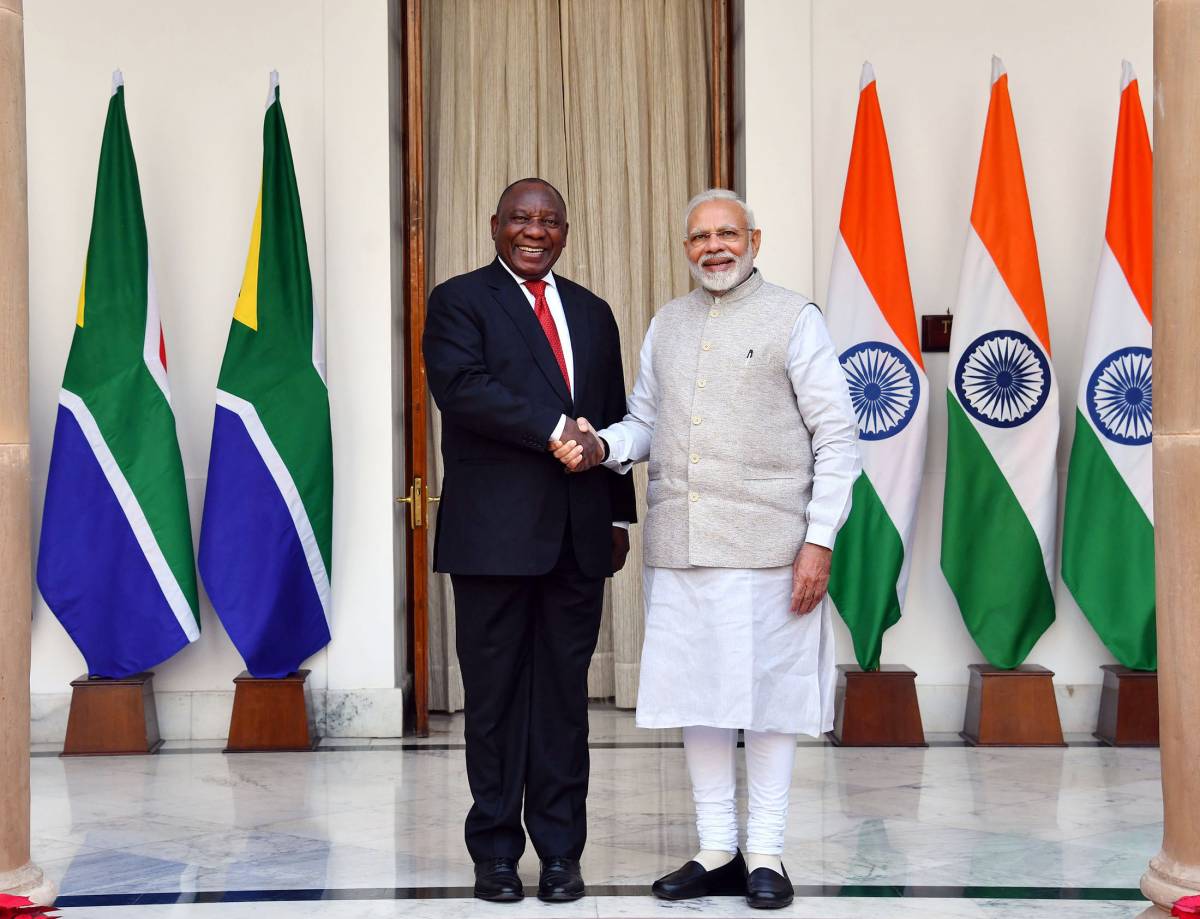India has always stood with Africa even if it formally announced its Africa policy only during the visit of PM Modi to Uganda in 2018, writes Amb Anil Trigunayat
The African Union and several regional organisations have attempted to discourage military coup d’etat that was quite frequent a couple of decades ago.
But Mali and several others have proved them otherwise. Likewise, smooth transition of democratic power, even if not unique to Africa after former US President Donald Trump’s refusal to accept the election results, has not always been easy.
Again, besides their politico-economic agony Africans have also been afflicted by the Corona pandemic. This has been worsened due to lack of health infrastructure, capacity, expertise and non-availability of vaccines despite COVAX and other commitments.
No wonder South African President Ramaphosa recently lamented the vaccine inequity calling it “Vaccine Apartheid” in Paris. The G7 countries have committed a billion doses but time is of essence.
South Africa and India were the first to urge the WTO and the developed world to temporarily waive the IPRs for their vaccines so that the disadvantaged people could have access to it. As such India’s ‘Vaccine Maitri’ initiative was exemplary irrespective of domestic criticism during the second wave.
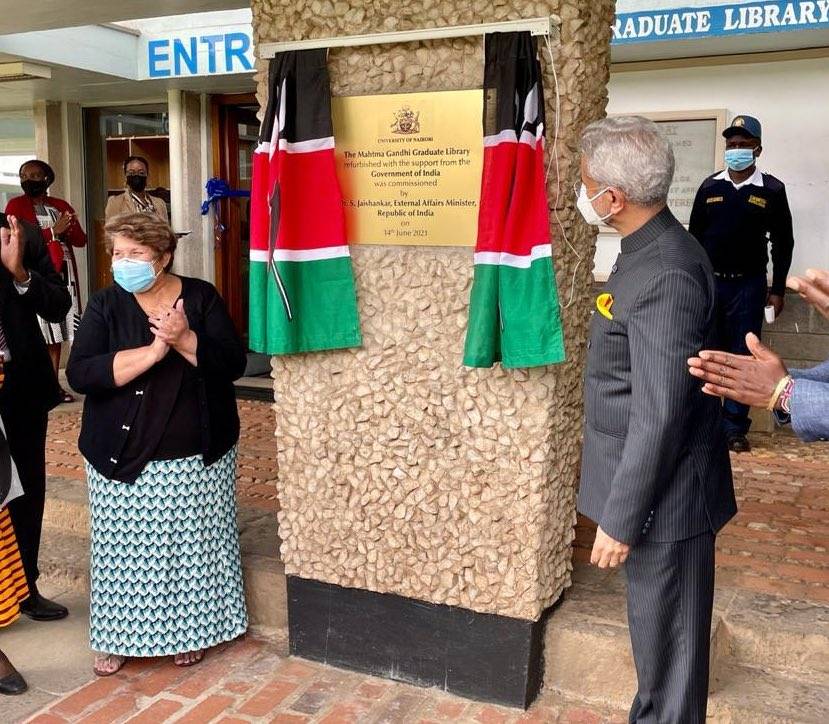
India has always stood with Africa even if it formally announced its Africa policy only during the visit of Prime Minister Narendra Modi to Uganda in 2018 when he addressed their Parliament essentially proclaiming that India stands with and believes in “Africa for Africans and by Africans.”
He outlined the Africa vision through his ten guiding principles which include : Africa is among top priorities for India and momentum of cooperation will be sustained through regular exchanges; development partnership as per African priorities; preferential access to Indian markets for African products; assist in harnessing digital revolution in Africa; improve Africa’s agriculture potential; fight climate change together; work together to keep oceans and maritime lanes free for all; Africa instead of becoming a theatre of competition should become nursery for its youth; and aspire and work together for a just , representative, democratic global order.
These are ideal, achievable and collaborative policies that dictate a paradigm shift compared to other big powers who are trying to get into the ‘Gold Rush’ for exploitation by way of neo-colonialist approaches.
The dragon is always present in all strategic calculations for most powers and India is no different. Today, China dominates in Africa which is acknowledged and feared by the US and the West.
Chinese leadership has been criss-crossing the continent leaving their large footprints by way of energy and mining deals and large scale infrastructure projects pertaining to railways, roads, ports, construction, agriculture, hydrocarbons, technology and strategic assets by extending loans and grants and through cultivation of leaderships.
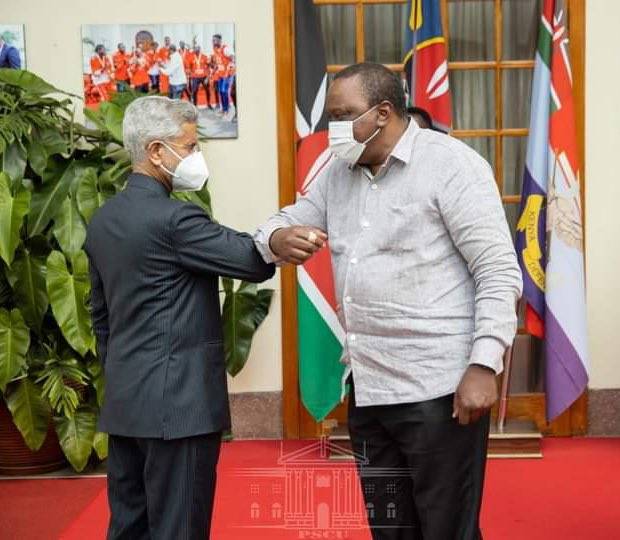
It is not for nothing that African countries figure prominently for Chinese Foreign Minister’s first visit in the year.
It has also tried to export its developmental model. No wonder China launched the FOCAC in 2000 that has been replicated by several countries like Japan, India, Russia, France, the US, the UK and the EU in slightly varying formats and even though most of them berate China for its debt trap diplomacy and exploitative engagement and predatory practices.
Many Africans do not buy that coming from the erstwhile colonisers. The US has recently tweaked its Africa policy to meet with the Chinese and Russian challenge in Africa.
China is also changing its perception management style and taking more recourse to investments and joint ventures while writing off several unrecoverable loans and debt. This was clearly evidenced during the 7th Forum on China-Africa Cooperation Summit (FOCAC) held in Beijing on September 3-4, 2018, where 53 African Heads of States participated.
ALSO READ: How India-South Africa is taking on Big Pharma at WTO
FOCAC that began in 2000 at Ministerial/Summit levels every three years has evolved into main driving force for Sino-African cooperation even though bilateral formats like China-Kenya Industrial Capacity Development Forum also exist.
In addition, China regularly undertakes high level visits to its African partner countries when huge bilateral projects and financing are announced. At the 7th FOCAC China reiterated its commitment to develop and enrich the comprehensive strategic and cooperative partnership.
The Beijing Declaration clearly ingrained the Chinese President’s Belt and Road Initiative (BRI) into the fabric of their Sino-African engagement which is now being securitised.
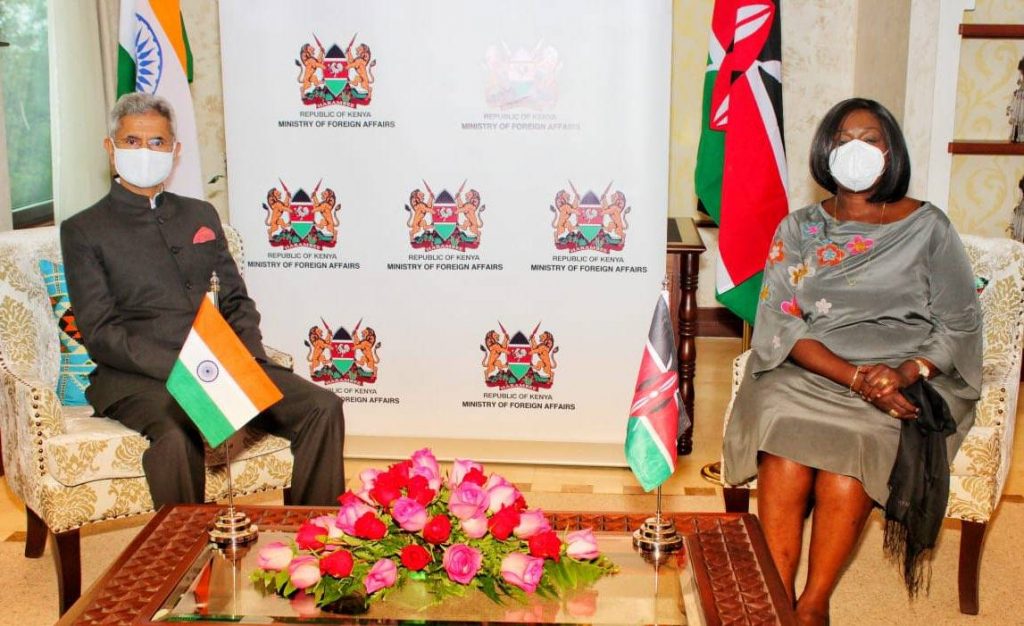
Capacity building and training programmes as well as the extensive Lines of Credit have been at the core of India’s outreach to Africa after championing their liberation struggles against colonialism.
This has also created a constituency of tremendous goodwill for India. The Indian technical and Economic Cooperation (ITEC) programme since 1964 has focussed on “Share and Care” under the spirit of South-South Cooperation. No wonder, several African leaders fondly recall their Indian teachers even after 40-50 years.
Several military officers were trained in India and rose to become Heads of government and Heads of State in their countries like former President Olusegun Obasanjo of Nigeria who were singularly instrumental in expanding cooperation with India.
At least six current or former African Chiefs of Armed Forces were trained in Indian military institutions and not less than 13 current or former Presidents, Prime Ministers and Vice Presidents attended educational or training institutions in India among a very large number of others.
India also created its own India-African Forum Summits (IAFS) since 2008. The format has graduated from regional interactive matrix to participation of all African leaders at the 3rd IAFS in New Delhi when Prime Minister Narendra Modi announced a fabulous package of concessional credit of US $ 10 billion, grants in aid of US $ 600 million and 50000 slots for training and higher education over the next five years.
India has already extended 180 LoCs amounting to $ 8 billion to over 40 countries. The dictum about Indian technologies is that they are Available, Adaptable, and Affordable and fit in with the stage of development a country or its constituents are.
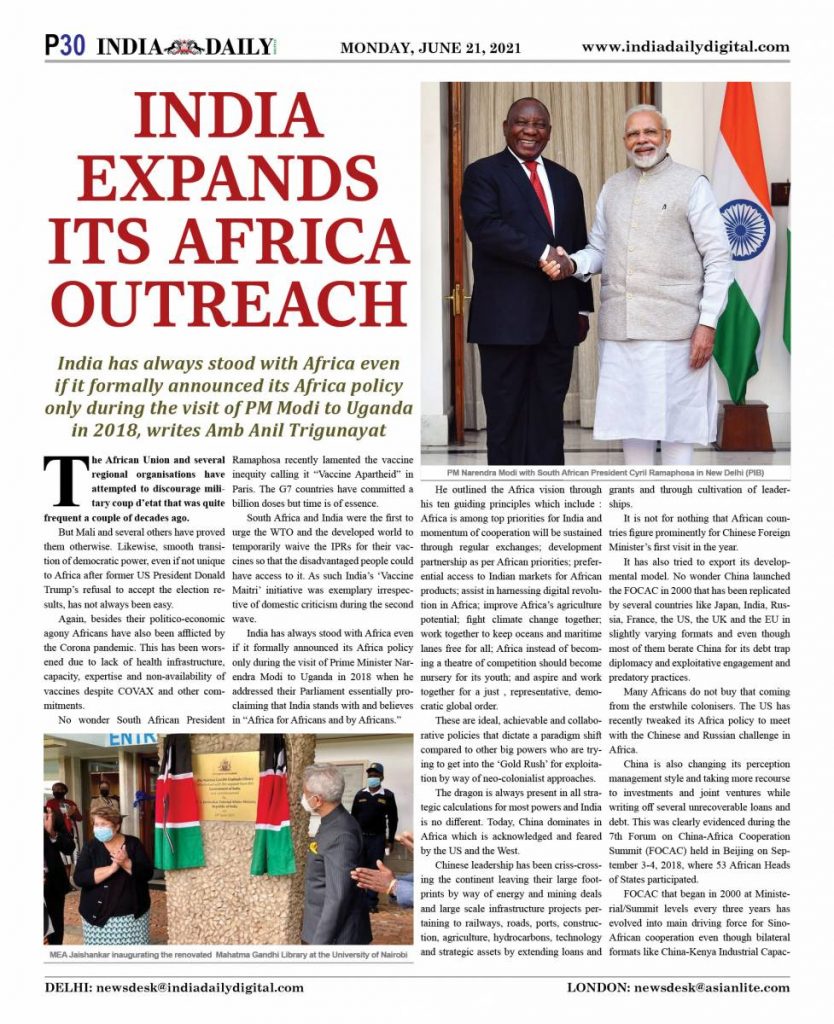
It has generated tremendous good will over time since these are demand driven according to African preferences. Similarly, Indian diaspora of about over two million is extremely important and is uniquely industrious in the region.
It does act as a bridge even if sometimes they have provoked the wrath of some local communities through their public behaviour but that has changed a great deal. In many countries they have enough economic clout and are major creators of employment through their industrial enterprise.
Even during the Covid-19 times India supplied medicines, vaccines, and health related equipment to over 42 countries in Africa. This is not new. India has been rendering health related assistance during all the calamities natural or otherwise–be it AIDs, TB and Ebola to Africa.
Speaking at the UN meet on Africa last month External Affairs Minister Dr S Jaishankar not only supported Africa’s legitimate place and representation at the reformed UNSC but also at other multilateral organisations.
He reiterated that India’s commitment to Africa is visible in our 189 projects in 41 African countries being implemented under concessional loans.
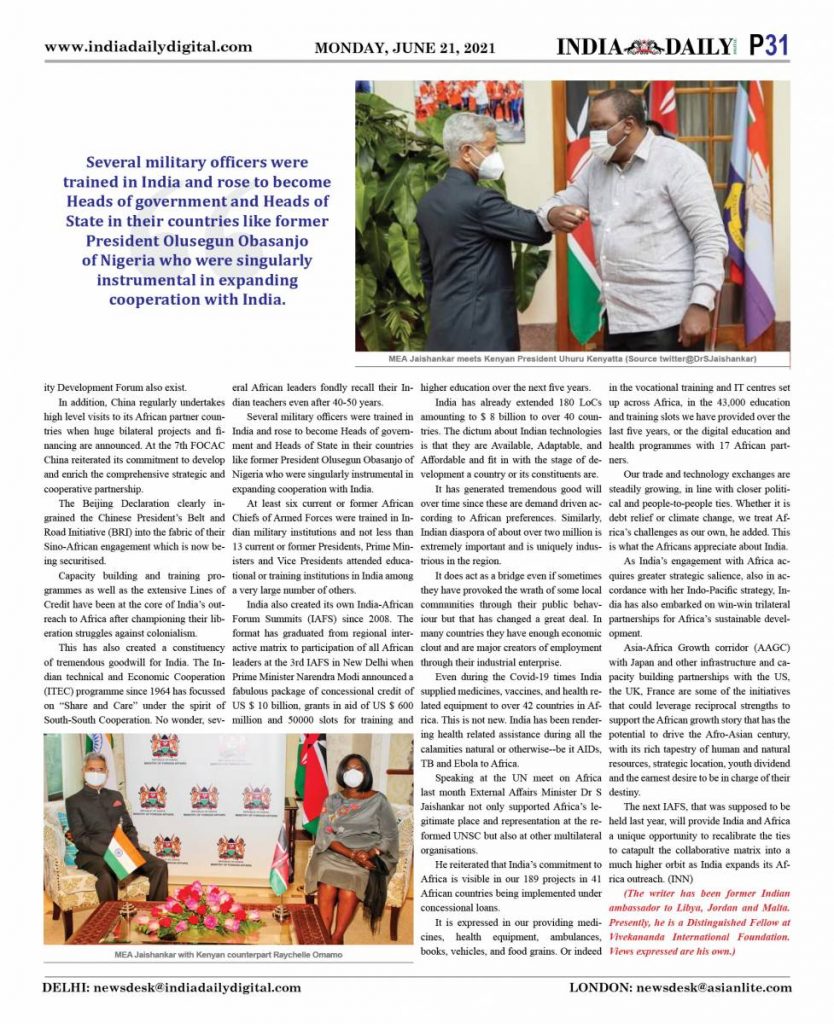
It is expressed in our providing medicines, health equipment, ambulances, books, vehicles, and food grains. Or indeed in the vocational training and IT centres set up across Africa, in the 43,000 education and training slots we have provided over the last five years, or the digital education and health programmes with 17 African partners.
Our trade and technology exchanges are steadily growing, in line with closer political and people-to-people ties. Whether it is debt relief or climate change, we treat Africa’s challenges as our own, he added. This is what the Africans appreciate about India.
As India’s engagement with Africa acquires greater strategic salience, also in accordance with her Indo-Pacific strategy, India has also embarked on win-win trilateral partnerships for Africa’s sustainable development.
Asia-Africa Growth corridor (AAGC) with Japan and other infrastructure and capacity building partnerships with the US, the UK, France are some of the initiatives that could leverage reciprocal strengths to support the African growth story that has the potential to drive the Afro-Asian century, with its rich tapestry of human and natural resources, strategic location, youth dividend and the earnest desire to be in charge of their destiny.
The next IAFS, that was supposed to be held last year, will provide India and Africa a unique opportunity to recalibrate the ties to catapult the collaborative matrix into a much higher orbit as India expands its Africa outreach. (INN)
(The writer has been former Indian ambassador to Libya, Jordan and Malta. Presently, he is a Distinguished Fellow at Vivekananda International Foundation. Views expressed are his own.)
ALSO READ: India has quietly upped its game in Africa
ALSO READ: How India-South Africa is taking on Big Pharma at WTO

